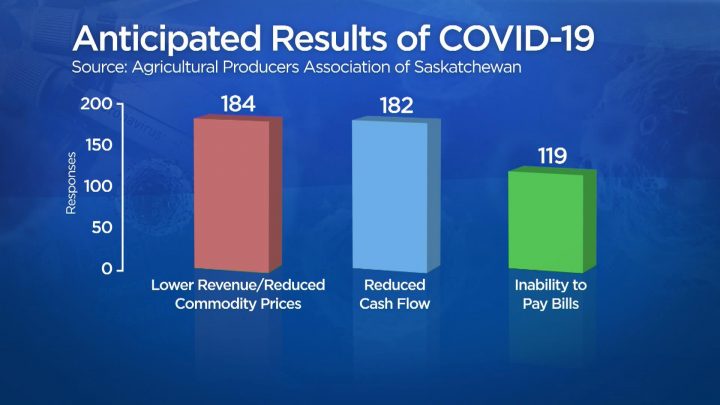A survey conducted by a group that represents Saskatchewan farmers and ranchers shows that most are worried about their income during the COVID-19 pandemic.

Earlier this year, farm exports were hammered by railway strikes and blockades and some producers were unable to get their grain to market, which means there’s no money coming in.
Spring seeding is just around the corner, when farmers need money for things like seed, fertilizer and fuel.
“The grain’s still sitting in the bin. So those are issues that if we don’t have the money it’s hard to spend it and it’s very frustrating. Some producers have pointed out that because of shipping issues and so on they haven’t been able to access that capital at a very important time of year,” said Todd Lewis, president of the Agricultural Producers Association of Saskatchewan (APAS).
The APAS survey results found nearly half of the farmers — 46 per cent — worry they won’t be able to pay their bills.
Survey results also indicate that 72 per cent of respondents anticipate lower revenue and reduced commodity prices, and 71 per cent anticipate less cash flow.

Get weekly health news
When asked what they need right now, 53 per cent of respondents said cash flow, 26 per cent said temporary pause or rescheduling of loan payments and 17 per cent said short term access to credit.
So far, the federal government’s response has been more flexibility around loans and payment dates, but a University of Saskatchewan agriculture and economics professor, Eric Micheels, said that’ll only help a bit.
“Farmers are, in some sense, want to have low debt loads so they can weather some of these ups and downs more easily, so taking on more debt wouldn’t be the farmers’ first choice in this,” Micheels said.
Micheels added that with restaurants not operating at full scale, there’s less demand for products like milk and bacon.
Lewis said there is fluctuation with commodity prices and the country’s leaders need to look at the long-term picture.
“I think we’ve got to be proactive on the agriculture side to ensure that the people of Canada have a safe and sustainable food supply going into the next number of weeks and months,” Lewis said.
APAS plans to continue with a weekly survey, to try to keep agriculture issues on the front burner for politicians in Regina and Ottawa.
The survey results, as published by APAS, did not contain information about the methodology or margin of error or equivalent.
Questions about COVID-19? Here are some things you need to know:
Health officials caution against all international travel. Returning travellers are legally obligated to self-isolate for 14 days, beginning March 26, in case they develop symptoms and to prevent spreading the virus to others. Some provinces and territories have also implemented additional recommendations or enforcement measures to ensure those returning to the area self-isolate.
Symptoms can include fever, cough and difficulty breathing — very similar to a cold or flu. Some people can develop a more severe illness. People most at risk of this include older adults and people with severe chronic medical conditions like heart, lung or kidney disease. If you develop symptoms, contact public health authorities.
To prevent the virus from spreading, experts recommend frequent handwashing and coughing into your sleeve. They also recommend minimizing contact with others, staying home as much as possible and maintaining a distance of two metres from other people if you go out.
For full COVID-19 coverage from Global News, click here.






Comments